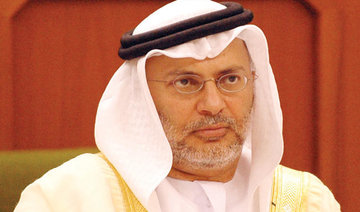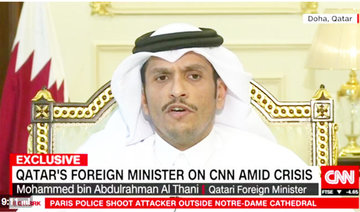 WASHINGTON: Donald Trump’s stance on the Gulf diplomatic crisis “slams the door” on Qatar’s ambitions, an analyst noted, after the US President said the move to cut ties with Doha could “be the beginning of the end to the horror of terrorism.”
WASHINGTON: Donald Trump’s stance on the Gulf diplomatic crisis “slams the door” on Qatar’s ambitions, an analyst noted, after the US President said the move to cut ties with Doha could “be the beginning of the end to the horror of terrorism.”
Saudi Arabia, the UAE, Egypt and several other states earlier this week moved to sever diplomatic ties with Doha over its alleged support for extremist groups.
Trump took credit for the ongoing debate in the Gulf Cooperation Council (GCC) over funding of extremism, tweeting Tuesday morning that “During my recent trip to the Middle East I stated that there can no longer be funding of Radical Ideology. Leaders pointed to Qatar — look!”
Ninety minutes later in another tweet, Trump praised the Saudi push to squeeze its neighbor: “So good to see the Saudi Arabia visit with the King and 50 countries already paying off. They said they would take a hard line on funding extremism, and all reference was pointing to Qatar.”
Trump added: “Perhaps this will be the beginning of the end to the horror of terrorism!”
In typical Trump fashion, the tweets generated fervent social-media debate about the US role in the standoff. Geopolitically, the tweets only add pressure on Qatar, according to regional experts.
“Trump’s tweets slam the door shut on the Qatar’s final hope: That American mediation would give it a face-saving way out without having to make too many compromises,” said Hussein Ibish, a senior resident scholar at the Arab Gulf States Institute in Washington.
Ibish told Arab News that Trump’s position puts the Arab states behind the steering wheel. “They are telling Qatar that it must choose, while being backed up by the American president,” the analyst said. As for Doha it “can now either back down or decide to become a full-blown client of Iran and hope for the best,” Ibish added.
Trump entering the fray “may force Qatar to recalibrate its stance,” a former Gulf official told Arab News. “Ever since the beginning of the crisis, the Qataris have been trumpeting American (statements) seemingly praising Qatar’s assistance in the fight against terror and military cooperation between the two countries,” the former official, who is following the crisis closely, said.
“American support was a key factor in (Doha’s) initial defiance. The president’s tweets are clearly leaning in the direction of the Saudi-led bloc, which is very concerning for Qatar,” he added.
Ibish said the US position makes “Doha completely trapped and even its impressive media and soft-power arsenal cannot do much to relieve it.” If the standoff is not resolved, Ibish pointed to further escalatory options for the Saudi-led bloc, “such as expulsion from the GCC and even an effort at regime change.” The expert concluded that “Doha will soon have no choice but to concede and shift policies, though how much and for how long remains to be seen.”
A senior GCC official told Arab News that “the only way this ends is if Qatar demonstrably changes course.” The official stressed that Saudi Arabia and the UAE “have been trying for years and only gotten token moves and denials from Qatar.” He added: “Every time Qatar sensed the pressure was off it went back to old habits.”
The US Defense Department reiterated, however, that “there has been no impact on our operations either in Qatar or with regards to airspace permission around it and we don’t anticipate there will be,” Pentagon spokesman Jeff Davis said in a briefing.
The former Gulf official did not anticipate a blowback on US-Qatari defense relations. “I don’t think the Qataris want to risk their defense ties with the Americans, especially now... the Pentagon and the State Department may step in to diffuse any tension with the Qataris.”
The timing with start of the Raqqa operation in Syria “raises concern among US military commanders about the impact of this crisis and the president’s tweet on their ability to fly sorties from Al Udeid” Air Base.
Trump suggests Qatar restrictions are ‘beginning of the end’ of terrorism
Trump suggests Qatar restrictions are ‘beginning of the end’ of terrorism

Ousted Bangladesh PM Hasina’s son denies graft in $12.65 billion nuclear deal

- Bangladesh’s Anti Corruption Commission has launched corruption inquiry into Rooppur Nuclear Power Plant project, backed by Russia’s state-owned Rosatom
- Rosatom, world’s largest supplier of enriched uranium, refuted the allegations, adding that it was committed to combat corruption in all its projects
NEW DELHI: Ousted Bangladesh Prime Minister Sheikh Hasina’s son and adviser on Tuesday described allegations of corruption involving the family in the 2015 awarding of a $12.65 billion nuclear power contract as “completely bogus” and a “smear campaign.”
Bangladesh’s Anti Corruption Commission said on Monday it had launched an enquiry into allegations of corruption, embezzlement and money laundering in the Rooppur Nuclear Power Plant project, backed by Russia’s state-owned Rosatom.
A deal for two power plants, each with a capacity of 1,200 megawatts, was signed in 2015.
The commission has alleged that there were financial irregularities worth about $5 billion involving Hasina, her son Sajeeb Wazed and her niece and British treasury minister Tulip Siddiq, through offshore accounts.
Rosatom, the world’s largest supplier of enriched uranium, refuted the allegations, adding that it was committed to combat corruption in all its projects and that it maintains a transparent procurement system.
“Rosatom State Corporation is ready to defend its interests and reputation in court,” it said in an emailed statement to Reuters.
“We consider false statements in the media as an attempt to discredit the Rooppur NPP project, which is being implemented to solve the country’s energy supply problems and is aimed at improving the well-being of the people of Bangladesh.”
Siddiq did not respond to a request for comment.
A spokesperson for British Prime Minister Keir Starmer said Siddiq had denied any involvement in the claims and that he had confidence in her. Siddiq would continue in her role, the spokesperson added.
Wazed, speaking on behalf of the family, said they were the targets of a political witch hunt in Bangladesh.
“These are completely bogus allegations and a smear campaign. My family nor I have ever been involved or taken any money from any government projects,” he told Reuters from Washington, where he lives.
“It is not possible to siphon off billions from a $10 billion project. We also don’t have any offshore accounts. I have been living in the US for 30 years, my aunt and cousins in the UK for a similar amount of time. We obviously have accounts here, but none of us have ever seen that kind of money.”
Reuters could not contact Hasina, who has not been seen in public since fleeing to New Delhi in early August following a deadly uprising against her in Bangladesh. Since then, an interim government has been running the country.
The government in Dhaka said on Monday it had asked India to send Hasina back. New Delhi has confirmed the request but declined further comment.
Wazeb said the family had not made a decision on Hasina’s return to Bangladesh and that New Delhi had not asked her to seek asylum elsewhere.
Kashmir’s ‘bee queen’ sets out to empower women, inspire youth

- Sania Zehra manages about 600 bee colonies, sells products across India
- She created an empowerment group to help aspiring women entrepreneurs
NEW DELHI: For the past four years, beekeeping has become central to Sania Zehra’s life. Every morning, she wakes at about 6 a.m. to tend to her colonies, before spending the rest of the day building the enterprise that turned her into the “bee queen” of Kashmir.
Her beekeeping journey began as a 16-year-old, watching her father hard at work at the family farm in Balhama in Indian-controlled Kashmir.
“I first saw my grandfather working with the bees, and then I saw my father doing the same business. When I saw my father working hard, I decided to also contribute and support him,” Zehra told Arab News.
She overcame her initial fear of bee stings and got to work immediately, applying for a government scheme that allowed her to expand the business.
It was not always smooth sailing — she struggled to make a profit in the first couple of years and had to juggle maintaining the hectic routine of beekeeping and selling her products.
But as her hard work of managing hundreds of colonies garnered her the “bee queen” title, today her products are being sold across the country.
“I am selling my product across India (and) I am getting orders from Saudi Arabia, Pakistan, Dubai, South Africa, Qatar and all,” Zehra said.
Beekeeping is a multi-pronged passion for the 20-year-old, who sees it as a way to protect the environment and preserve her family legacy.
She joins an increasing number of women in Kashmir who are running their own businesses, many of whom access government programs aimed at training and supporting women entrepreneurs.
Despite the social barriers that persist to this day, Zehra found support from her family, especially her mother.
“My mother supports me wholeheartedly. She says ‘I have sons but you have gone ahead of the boys and there is nothing that can stop a woman if she wants to,’” she said.
“For me, it’s a passion as well as a desire to carry the family legacy … I have been fascinated by bees’ social structure and the importance of bees in our ecosystem. I want to contribute to their conversation and produce natural honey and connect with nature. They are an inspiration for me.”
As time went by, she found that beekeeping was not only therapeutic for her mental health but also a way to support the entrepreneurial landscape in Kashmir.
To fuel that mission, Zehra created an empowerment group whose members comprise talented women who lack access to resources.
“My main focus is that I should act as a catalyst for many and help others to grow too,” she said.
With 40 members so far, Zehra is aiming to take it to 100 and help them gain access to the government initiatives that once helped her.
“I want to give employment to all,” Zehra said. “I have a future plan to address the unemployment issue in Kashmir and make Kashmir a wonderful place. I want to inspire young people.”
Pope calls for ‘arms to be silenced’ across world

- “I think of the Christian communities in Israel and Palestine, particularly in Gaza, where the humanitarian situation is extremely grave,” Pope Francis said
VATICAN: Pope Francis called Wednesday for “arms to be silenced” around the world in his Christmas address, appealing for peace in the Middle East, Ukraine and Sudan as he denounced the “extremely grave” humanitarian situation in Gaza.
He used his traditional “Urbi et Orbi” (“to the city and the world“) message to the world’s 1.4 billion Catholics to call for talks for a just peace in Ukraine as the country was pummelled by 170 Russian missiles and drones on Christmas morning.
“May the sound of arms be silenced in war-torn Ukraine,” the 88-year-old pontiff said, his voice strained and breathless. “May there be the boldness needed to open the door to negotiation and to gestures of dialogue and encounter, in order to achieve a just and lasting peace.”
In front of thousands of the faithful gathered in front of St. Peter’s Basilica in Rome, also appealed for a ceasefire in Gaza and for the freeing of Israeli hostages held there by Hamas.
“I think of the Christian communities in Israel and Palestine, particularly in Gaza, where the humanitarian situation is extremely grave. May there be a ceasefire, may the hostages be released and aid be given to the people worn out by hunger and by war,” he added.
Francis extended his call for a silencing of arms to the whole Middle East and to Sudan, which has been ravaged by a ravaged by 20 months of brutal civil war where millions are under the threat of famine.
“May the Son of the Most High sustain the efforts of the international community to facilitate access to humanitarian aid for the civilian population of Sudan and to initiate new negotiations for a ceasefire,” he said.
Passenger plane flying from Azerbaijan to Russia crashes in Kazakhstan with many feared dead

- The plane was carrying 67 passengers and five crew, Kazakh authorities say 12 people had survived
- Azerbaijan Airlines said aircraft forced to make emergency landing approximately 3 km from Aktau
ASTANA: An Embraer passenger plane flying from Azerbaijan to Russia crashed near the city of Aktau in Kazakhstan on Wednesday with 67 passengers and five crew on board, Kazakh authorities announced, saying 12 people had survived.
Unverified video of the crash showed the plane, which was operated by Azerbaijan Airlines, bursting into flames as it hit the ground and thick black smoke then rising.
The Central Asian country’s emergencies ministry said in a statement that fire services had put out the blaze and that survivors were being treated at a nearby hospital.
Azerbaijan Airlines said the Embraer 190 aircraft, with flight number J2-8243, had been flying from Baku to Grozny, the capital of Russia’s Chechnya, but had been forced to make an emergency landing approximately 3 km (1.8 miles) from the Kazakh city of Aktau.
Russian news agencies said the plane had been rerouted due to fog in Grozny.
Authorities in Kazakhstan said they had begun looking into different possible versions of what had happened, including a technical problem, Russia’s Interfax news agency reported.
Pakistan air strikes kill 46 in Afghanistan: Taliban spokesman

- Border tensions between the two countries have escalated since the Taliban government seized power in 2021
KABUL: Pakistan air strikes in an eastern border province of Afghanistan killed 46 people, the Taliban government spokesman told AFP on Wednesday.
“Last night (Tuesday), Pakistan bombarded four points in the Barmal district of Paktika province. The total number of dead is 46, most of whom were children and women,” spokesman Zabihullah Mujahid said.
He added that six more people were wounded, mostly children.
A defense ministry statement late Tuesday condemned the latest strikes by Pakistan on Afghan territory, calling them “barbaric” and a “clear aggression.”
“The Islamic Emirate will not leave this cowardly act unanswered, but rather considers the defense of its territory and sovereignty to be its inalienable right,” the statement said, using the Taliban authorities’ name for the government.
Border tensions between the two countries have escalated since the Taliban government seized power in 2021, with Islamabad claiming militant groups are carrying out regular attacks from Afghanistan.
Islamabad has accused Kabul’s Taliban government of harboring militant fighters, allowing them to strike on Pakistani soil with impunity.
Kabul has denied the allegations.


















